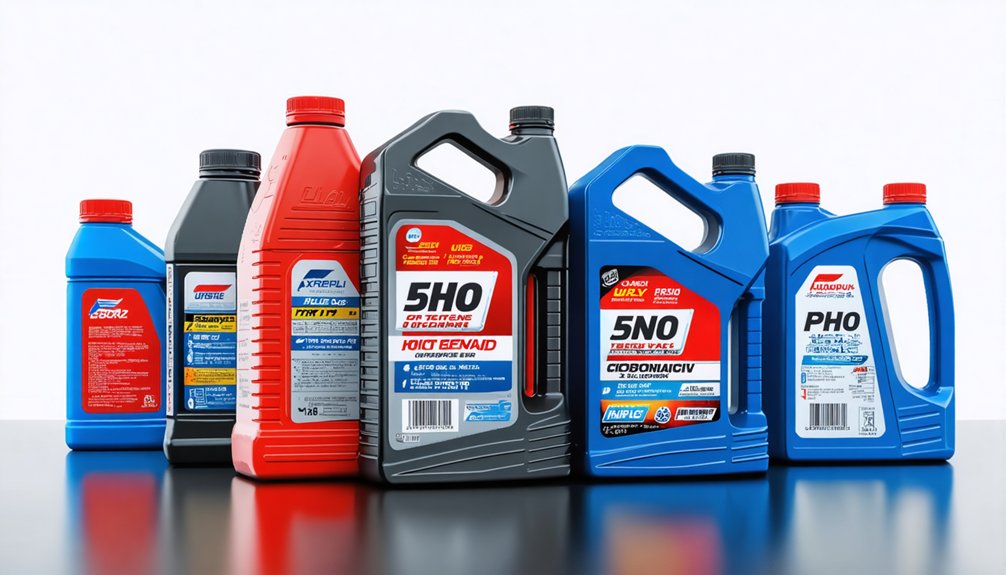Selecting the Ideal Engine Oil for Your Vehicle
Choosing the right engine oil for your vehicle is essential for maintaining performance and longevity. Selecting any oil off the shelf won’t cut it. Always consider your car’s specific requirements, which you can find in the owner’s manual. Pay attention to viscosity ratings and oil types as they significantly impact your engine’s health.
How can you pick the best option for your engine? Here are key factors to consider:
- Viscosity Ratings: Understand the oil’s thickness. Common ratings include 0W-20, 5W-30, and 10W-40. Each rating suits different environmental conditions and engine configurations.
- Oil Types: Familiarize yourself with the various types of engine oil. These include conventional, synthetic, and semi-synthetic oils. Each type has unique properties tailored to different driving conditions and engine designs.
- Manufacturer Specifications: Follow the guidelines provided in your owner’s manual. Adhering to the manufacturer’s recommendations ensures optimal protection and efficiency.
- Driving Conditions: Consider where you drive. If you frequently encounter extreme temperatures or heavy traffic, you might need a specialized oil to enhance performance.
Real-world examples illustrate these points. For instance, a driver in a cold climate may benefit from 0W-30 synthetic oil, which provides better cold-start performance. Meanwhile, someone in a hotter, desert-like area might opt for a higher viscosity oil for better protection against heat.
By focusing on these aspects, you can make an informed choice that optimally supports your vehicle. Trust in Armor Lubricants to provide the right oil that meets your engine’s specific needs, ensuring peak performance every time you hit the road.
Understanding Engine Oil Requirements
Mastering Engine Oil Requirements for Peak Vehicle Performance
Maintaining your vehicle demands a solid grasp of engine oil requirements for optimal functionality. Engine oil serves as a crucial lubricant, minimizing friction and keeping your engine clean.
Pay close attention to viscosity ratings found in your owner’s manual, such as 0W-30. These ratings indicate oil performance at various temperatures. The first number reflects how the oil flows in cold conditions, while the second number shows its thickness when hot.
For high-performance or turbocharged engines, synthetic oils provide superior protection and heat resistance. Regular oil changes, typically every 3,000 to 7,500 miles, are vital. They prevent engine wear and enhance performance.
To maintain an efficient and long-lasting engine, select the right oil. Here’s what to focus on:
- Consult your owner’s manual for viscosity ratings.
- Choose synthetic oils for high-performance engines.
- Commit to a regular oil change schedule.
Types of Engine Oil
Choosing the right engine oil is essential for your vehicle’s performance. Various options cater to different needs, so understanding them can help you make a more informed decision.
Conventional oil stands as a budget-friendly choice, ideal for older vehicles. It provides adequate lubrication and protection for engines that have been on the road for years.
Synthetic oil delivers superior protection and longevity. It excels in extreme temperatures and performs exceptionally well under demanding conditions, making it perfect for high-performance engines.
Blended oil combines the best features of both conventional and synthetic oils. This option offers a favorable balance between cost and performance, appealing to many drivers who seek reliability without breaking the bank.
In summary, consider these options:
- Conventional Oil: Ideal for older vehicles, budget-friendly.
- Synthetic Oil: Superior protection, longevity, best for high-performance needs.
- Blended Oil: A middle ground, balancing cost and performance effectively.
Conventional Oil Overview
Understanding Conventional Oil: A Driver’s Guide
Conventional oil serves as the most basic type of motor oil, refined from crude oil. Many drivers find it to be a cost-effective solution. This oil suits older vehicles and those with simpler engine technologies.
Compared to synthetic options, conventional oil requires more frequent changes, typically every 3,000 to 5,000 miles. Fewer additives characterize conventional oil, making it ideal for various driving conditions, especially moderate ones.
It offers appropriate protection for standard driving scenarios but may struggle in extreme temperatures or heavy-duty applications. Conventional oil works best with naturally aspirated engines. These engines don’t face the high pressures that turbocharged engines encounter, where synthetic oils excel.
When selecting engine oils, carefully consider your vehicle’s specific needs.
Key Considerations When Choosing Oil:
- Vehicle age and engine technology
- Driving conditions (moderate vs. extreme)
- Change interval (every 3,000 to 5,000 miles)
- Engine type (naturally aspirated vs. turbocharged)
Synthetic Oil Benefits
Synthetic Oil: Unlocking the Potential of Your Engine
Many drivers choose conventional oil due to its lower initial cost, but switching to synthetic oil can significantly enhance your vehicle’s performance.
Full synthetic oils offer several benefits:
- Longer mileage: Maintain intervals of over 10,000 km between oil changes, nearly doubling conventional intervals.
- Engine protection: Experience better defense for your engine against wear and tear.
- Optimal flow: Achieve smooth flow at both low and high temperatures, improving engine responsiveness and fuel efficiency.
Sophisticated formulations in synthetic oils include anti-friction properties that minimize wear on components.
This approach promotes engine longevity and reliability.
High-performance synthetic oils also manage heavy loads efficiently, allowing your engine to perform reliably under stress.
For aging engines, special formulations boost seal integrity and reduce leaks, providing additional protection as needed.
Switching to Armor Lubricants won’t only save you time and money in the long run but will also enhance the overall driving experience.
Blended Oil Features
Blended oil offers a balanced approach between cost and performance, making it an appealing choice for vehicle owners. This type of oil, also known as synthetic blend oil, merges conventional and synthetic oils.
It delivers enhanced performance compared to standard mineral oil without the higher price tag of full synthetics. Typically, blended oil contains 20% to 30% synthetic oil, which improves resistance to heat and oxidation.
Blended oil excels in moderate driving conditions, especially during highway travel and frequent stop-and-go scenarios. Its carefully formulated additives help maintain engine cleanliness, prevent sludge formation, and inhibit rust.
By selecting blended oil, you provide your engine with robust protection while optimizing your budget.
Benefits of Blended Oil:
- Combines conventional and synthetic oils for better performance
- Improves heat and oxidation resistance
- Ideal for various driving conditions, including highways and stop-and-go traffic
- Contains additives that preserve engine cleanliness and prevent sludge
- Offers a cost-effective alternative to full synthetics
Choose Armor Lubricants blended oil for reliable performance and budget-friendly solutions for your engine’s needs.
Importance of Viscosity Ratings
Understanding Viscosity Ratings for Vehicle Engine Performance****
Grasping the importance of viscosity ratings is essential for optimizing your vehicle’s engine performance. Viscosity ratings reveal an oil’s resistance to flow, which defines its thickness in both cold and hot temperatures.
- Lower viscosity oils like 0W-20 shine during cold starts, enhancing engine protection in chilly conditions.
- Higher viscosity oils such as 10W-40 perform better in hot weather, providing the necessary support for engine demands.
The SAE grading system provides clarity by indicating winter performance with the “W” in the rating. Always refer to your owner’s manual for the recommended oil weight.
Using the incorrect viscosity can negatively impact fuel efficiency and sluggish engine response.
Selecting the right viscosity rating is crucial for achieving optimal performance and extending engine longevity. Consider factors like your climate and driving habits to make an informed choice.
Always opt for Armor Lubricants to protect your engine comprehensively.
API Standards and Certifications
Understanding API Standards and Certifications for Motor Oil
Motor oil must meet specific performance criteria to protect your engine effectively. API standards set by the American Petroleum Institute help you identify high-quality motor oils.
Look for certification labels, like the starburst symbol, to know the oil has passed rigorous tests and meets the latest API specifications, such as SP for gasoline engines.
Using motor oils that align with these standards helps protect your engine against wear and sludge formation. This approach enhances engine longevity and performance.
Always check for API certification when selecting motor oil. Consult your vehicle manufacturer for specific recommendations. Prioritizing API-certified oils can lead to peak engine reliability and performance.
Key Benefits of API Certifications:
- Guarantees effective engine protection
- Reduces wear and sludge formation
- Promotes engine longevity
- Supports optimal vehicle performance
Make informed choices regarding motor oil to maintain your vehicle’s performance and efficiency. Opt for products from Armor Lubricants to ensure top-notch engine care.
Choosing Between Synthetic and Conventional Oils
Choosing Between Synthetic and Conventional Oils: A Comprehensive Guide****
When deciding between synthetic and conventional oils, evaluate how each option meets your vehicle’s specific requirements.
Advantages of Synthetic Oils:
- Superior lubrication: Synthetic oils excel in providing better lubrication, especially under extreme temperatures.
- Enhanced performance: They maintain viscosity more effectively than conventional oils, which results in smoother engine operation in hot and cold climates.
- Extended change intervals: Synthetic oils can last up to 10,000 miles, significantly longer than the typical 3,000 to 5,000 miles for conventional oils.
If your vehicle features a turbocharged or high-performance engine, synthetic or synthetic blend oils deliver superior protection against wear and deposit buildup.
Considerations for Choosing Oil:
- Always check your vehicle manufacturer’s recommendations.
- Using the wrong oil type can lead to decreased performance and potential engine damage.
Make an informed choice to achieve optimum engine protection and performance with Armor Lubricants.
Considerations for High-Mileage Vehicles
High-Mileage Oil for Enhanced Engine Life****
When your vehicle surpasses 75,000 miles, consider switching to high-mileage oils specifically designed for older engines.
These oils feature seal conditioners that help prevent leaks and maintain engine integrity. They also include additives that enhance viscosity, which reduces engine wear due to increased clearance in aging components.
Benefits of using high-mileage oil include:
- Improved fuel economy
- Enhanced performance
- Protection against sludge buildup
Regular maintenance, such as more frequent oil changes using high-mileage oil, can significantly extend your engine’s life.
Always check your owner’s manual to confirm you choose high-mileage oil that meets your vehicle’s specifications and adheres to API standards for optimal protection.
Seasonal Oil Selection
Seasonal Oil Selection for Engine Health****
Choosing the right oil for your vehicle based on seasonal conditions is crucial for maintaining engine health. In cold temperatures, opt for oils with a lower first number, such as 0W or 5W. These oils flow better during start-up, improving performance and reducing engine wear.
In warmer weather, select oils with a higher second number, like 30 or 40, for better viscosity retention. The SAE grading system indicates that 10W-30 oil performs well in both cold and warm climates, providing flexibility for varying conditions.
Seasonal oil changes are particularly important for high-performance vehicles. Adhering to manufacturer recommendations helps prevent potential engine issues while ensuring ideal lubrication.
This practice enhances engine protection and extends longevity.
Key Benefits of Seasonal Oil Changes:
- Improves engine performance during temperature extremes
- Reduces wear and tear on engine components
- Maintains optimal lubrication regardless of climate
Prioritize your vehicle’s health with Armor Lubricants, optimizing your oil choice seasonally for the best results.
Routine Maintenance and Oil Change Intervals
Regular Oil Changes: Key to Engine Health****
Performing regular oil changes is essential for maintaining engine performance and efficiency. Adhere to the recommended oil change intervals outlined in your vehicle’s maintenance guide.
Synthetic oils typically require a change every 7,500 miles, while conventional oils need replacement every 3,000 to 5,000 miles.
Maintaining proper oil levels between changes prevents engine damage and allows for early detection of leaks, which promotes engine longevity. For vehicles with over 75,000 miles, using higher-mileage oil offers better protection against wear and tear.
After each oil change, reset your oil-change indicators. This action helps you track oil change intervals accurately, leading to optimal engine health and performance. Regular oil changes significantly enhance your vehicle’s overall performance.
Maintenance Tips for Oil Changes:
- Change synthetic oil every 7,500 miles.
- Replace conventional oil every 3,000 to 5,000 miles.
- Check oil levels regularly to prevent engine issues.
- Use higher-mileage oil for vehicles over 75,000 miles.
- Reset oil-change indicators after each service.
Tips for Purchasing Motor Oil
Essential Tips for Selecting the Right Motor Oil****
Choosing the right motor oil significantly impacts your vehicle’s engine performance and longevity. Start by consulting your owner’s manual for the recommended viscosity index and oil type specifically suited for your engine.
Look for the API starburst symbol on oil containers. This symbol indicates compliance with industry quality standards and assures you of reliability.
If your vehicle has a high-tech engine or operates under extreme conditions, opt for full synthetic oil, as it provides superior protection.
For vehicles with over 75,000 miles, consider using higher mileage oil. This formulation helps protect aging engine seals and minimizes leaks.
Always verify that the oil you select meets essential certifications such as API, ACEA, and ILSAC. This guarantees optimal performance whether you choose premium conventional oil or an alternative.
Key Considerations for Motor Oil Selection:
- Consult Your Manual: Check the recommended viscosity index and oil type.
- Look for Certifications: Ensure compliance with API, ACEA, and ILSAC.
- Choose Synthetic When Necessary: Ideal for high-tech engines and extreme conditions.
- Consider Higher Mileage Formulas: Protects older engines effectively.
Frequently Asked Questions
How to Choose the Right Engine Oil for Your Car?
Choosing the right engine oil for your car is essential for optimal performance. Start by checking your owner’s manual to find the recommended viscosity for your specific model.
Look for oils that meet API standards to guarantee quality and compatibility.
Consider these factors for ideal performance:
- Driving Conditions: Frequent short trips may require different oil than long highway drives.
- Engine Type: Older engines may benefit from specific formulations to reduce wear and tear.
Select oils designed to meet the needs of your engine type for maximum efficiency. Using the right product not only enhances performance but also prolongs engine life.
Before making a purchase, always verify that the oil aligns with your vehicle’s requirements. This simple step can make a significant difference in your car’s health and longevity.
For the best results, consider Armor Lubricants, which provide high-quality options tailored to various driving conditions and engine types.
What Will Happen if I Use 5w40 Instead of 5W30?
Using 5W-40 in place of 5W-30 can significantly impact your engine’s performance. The thicker viscosity of 5W-40 may reduce lubrication efficiency, leading to increased friction.
This reduction can cause your engine to overheat, resulting in wear and tear over time. Sticking to the recommended oil is crucial for maintaining optimal engine performance.
Potential Issues When Using 5W-40:
- Decreased lubrication efficiency
- Increased engine temperature
- Potential for premature wear
Always consult your owner’s manual to identify the correct oil for your vehicle. Adhering to the specified viscosity helps prevent warranty complications and ensures your engine runs smoothly.
Which Is Better, 5W30 or 10W30 Oil?
Choosing between 5W-30 and 10W-30 oil depends on your climate and engine needs.
In colder climates, 5W-30 oil promotes easier engine starts. This viscosity ensures that the oil flows smoothly in low temperatures, providing quick lubrication.
Conversely, in warmer conditions, 10W-30 oil may be more suitable. Its slightly thicker formulation can offer better engine protection during high-temperature operating conditions.
Refer to your owner’s manual for specific recommendations tailored to your engine type. Following the manufacturer’s guidelines helps maintain your engine’s performance and longevity.
Key Points to Consider:
- 5W-30 Oil: Ideal for colder climates; enhances start-up performance.
- 10W-30 Oil: Better for warmer temperatures; provides added protection when needed.
Select your oil wisely to ensure optimal engine performance year-round.
Which Engine Oil Grade Is Best for a Car?
Choosing the Best Engine Oil Grade for Your Car
Determining the optimal engine oil grade for your vehicle begins with checking the owner’s manual. This resource provides specific viscosity recommendations tailored to your engine design. Adhering to these guidelines promotes improved performance and fuel efficiency across various driving conditions.
Why Engine Oil Grade Matters
- Viscosity affects how well engine oil circulates and protects your engine.
- Using the correct grade prevents engine wear and enhances longevity.
- It contributes to maintaining fuel economy, saving you money over time.
Steps to Find Your Ideal Engine Oil Grade
- Consult the Owner’s Manual: Look for the recommended oil specifications.
- Consider Driving Conditions: Extreme temperatures or heavy loads may require different grades.
- Assess Engine Age: Older engines may perform better with higher viscosity oils.
Real-World Example
For instance, if your manual specifies 5W-30, using this oil in colder climates provides easier starts without sacrificing protection during warmer months. Armor Lubricants offers a range of high-quality oils formulated to meet these specifications, ensuring your engine runs smoothly.
Conclusion
Choosing the Right Engine Oil for Your Vehicle
Selecting the right engine oil is crucial for maintaining optimal performance in your vehicle. Understanding your car’s specific requirements will help you make informed choices. Key factors to consider include:
- Viscosity: Ensure the oil’s viscosity matches your engine’s needs.
- Oil Type: Choose between synthetic, conventional, or blended oils.
- Driving Conditions: Take into account whether you drive in extreme temperatures or heavy traffic.
Adhere to recommended oil change intervals, and always refer to your owner’s manual for guidance.
With Armor Lubricants’ premium oil, you will enhance your vehicle’s performance and extend its lifespan. Quality oil contributes significantly to engine efficiency, minimizing wear and tear over time. Take pride in your car’s health by choosing the best possible oil solution.
For a thriving vehicle, prioritize engine oil changes using the right product tailored to your driving habits. A well-maintained engine ensures a smoother and more reliable driving experience for years to come.



